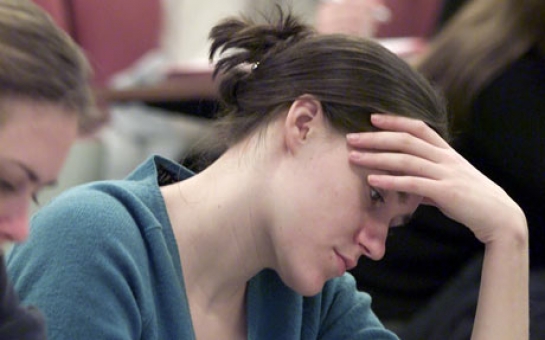Following the completion of my PhD and a short stint as a postdoc, I have recently taken up a new job as a researcher development officer at a research-intensive university. Teams like ours are fairly common in universities, thanks to funding provided following the publication of the Roberts Report in 2002.The team I work on provides personal and professional development opportunities to the researchers at the university; including the PhD students, postdocs, and lecturers. Like most researcher development teams, the majority of our training focuses on the postgraduate students. We run an annual programme of training sessions and workshops designed to help students transition to the life of a researcher, make it through the official (and unofficial) milestones of their PhD, and emerge as well-rounded, employable people with a range of career options.When the situation calls for it, we are shoulders to cry on.Yes, I now get paid to relive the worst experience of my life, and hope that I can use that experience to help others. On a daily basis, I meet PhD students who feel underequipped in one way or another.Best case scenario: they are doing well in their PhD, and have come to the researcher development programme for advice about the next steps in their lives and careers. They come to us for some advice about volunteering, becoming a mentor, obtaining work experience, making use of their existing networks, what it's like to have a career outside academia and so on.More often than we'd like, they arrive for a session about "building and maintaining an effective relationship with your supervisor" with puffy red eyes, lack the confidence to participate in the session, and leave at the end without having uttered a single word.Worst case scenario: we never meet them at all. Or one day, they quietly leave the university without their qualification.Last weekend, there was a funeral. Two of the parishioners from my family's local church community suffered the loss of their son, we'll call him J.J had suffered with mental health issues throughout his life, and had finally taken his own life. He was studying for a PhD at the time. From what I understand, J was a bright student who did exceptionally well at undergraduate level. Hence, being accepted to do a PhD.Once at the new university, J struggled to stay on track with his postgraduate studies. He took a couple of breaks from research to try to recover his mental health. Sadly, he committed suicide before he completed his PhD.I cannot say that it was the pressure of his studies that drove J to that decision; after all, I didn't know him. But I do know what doing a PhD is like.I have experienced the effects on my mental health, and I have witnessed the culture of acceptance surrounding this issue.Among the people I do know who have done PhDs, I have seen depression, sleep issues, eating disorders, alcoholism, self-harming, and suicide attempts. I have seen how issues with mental health can go on to affect physical health. During my PhD I noticed changes to my skin, and changes in my menstrual cycle which persist to this day.Let us not forget that in the majority of cases, all this comes at a time when you are likely to be suffering from financial instability, or are forced to make uncomfortable changes to your personal circumstances to accommodate your studies.We have all joked about seeing the sleeping bag tucked under the lab bench. These issues are common. Shockingly, they are also commonly accepted.Many PhD students take the view that if you're not doing overnight experiments, missing meals, or binge drinking, you're not doing it right."Some people choose to have a social life while they're doing their PhD. And that's OK. But I'm not," one of my fellow PhD students tells me.Who else is supposed to help you? Your supervisor? "A blemish on my career," is how one academic referred to their experience of supervising a student who developed mental health difficulties during their studies.Mental health problems are often not perceived to be anything to do with supervisory inadequacies. It is important to remember that academics who are PhD supervisors did not make it to their current rank because of their exceptional supervising skill. They got to that position by being an excellent researcher, and winning some cash.Clearly, you can't budget for empathy. Today, I say that we should not accept this.It is not OK for PhD students to become so affected by their studies that they kill themselves.It is not OK for PhD students to maintain the culture of working yourself to the point of illness.It is not OK for academics to wash their hands of the situation.In my new role, I have seen students asking:"How do I tell myself that it's OK to take time for me?""Have I worked so hard that illness has become normal?""How can I recover my relationships with my friends and family?"Despite this, I see students and academics who view the researcher development service as unnecessary. I see students who imagine using our services as an "admission of defeat". To come to us, is to announce that you are not a perfect researcher. I see students ashamed to admit to their peers that they had come to any of our sessions, let alone found them useful.I see students forcibly removed from our sessions by their supervisors. I see leading academics decline to advertise our services, for fear that people will use them. I see students who feel like it is not OK to admit that they are not OK. And this is not OK.I watched my family try their best to support J's family when they got the news, and try to support one another when we were alone. They reminisced about the bright young boy they had watched growing up, and wondered what had happened to him.On the day of his funeral, cars lined the streets of the sleepy village where he and his family had lived, to the point where traffic was interrupted. The church was overflowing. People had come in their hundreds, from miles around, to pay their respects to the young man, and mourn his early passing.What will you do to stop situations like this from happening again?(theguardian.com)ANN.Az
There is a culture of acceptance around mental health issues in academia
Society
19:26 | 06.03.2014

There is a culture of acceptance around mental health issues in academia
It is all too common to see PhD students work themselves to the point of physical and mental illness in order to complete their studies. It is less common to see PhD students who feel that they are under such pressure that the only option is suicide. But it does happen. There is a culture of acceptance around mental health issues in academia – and this needs to change.
Follow us !










